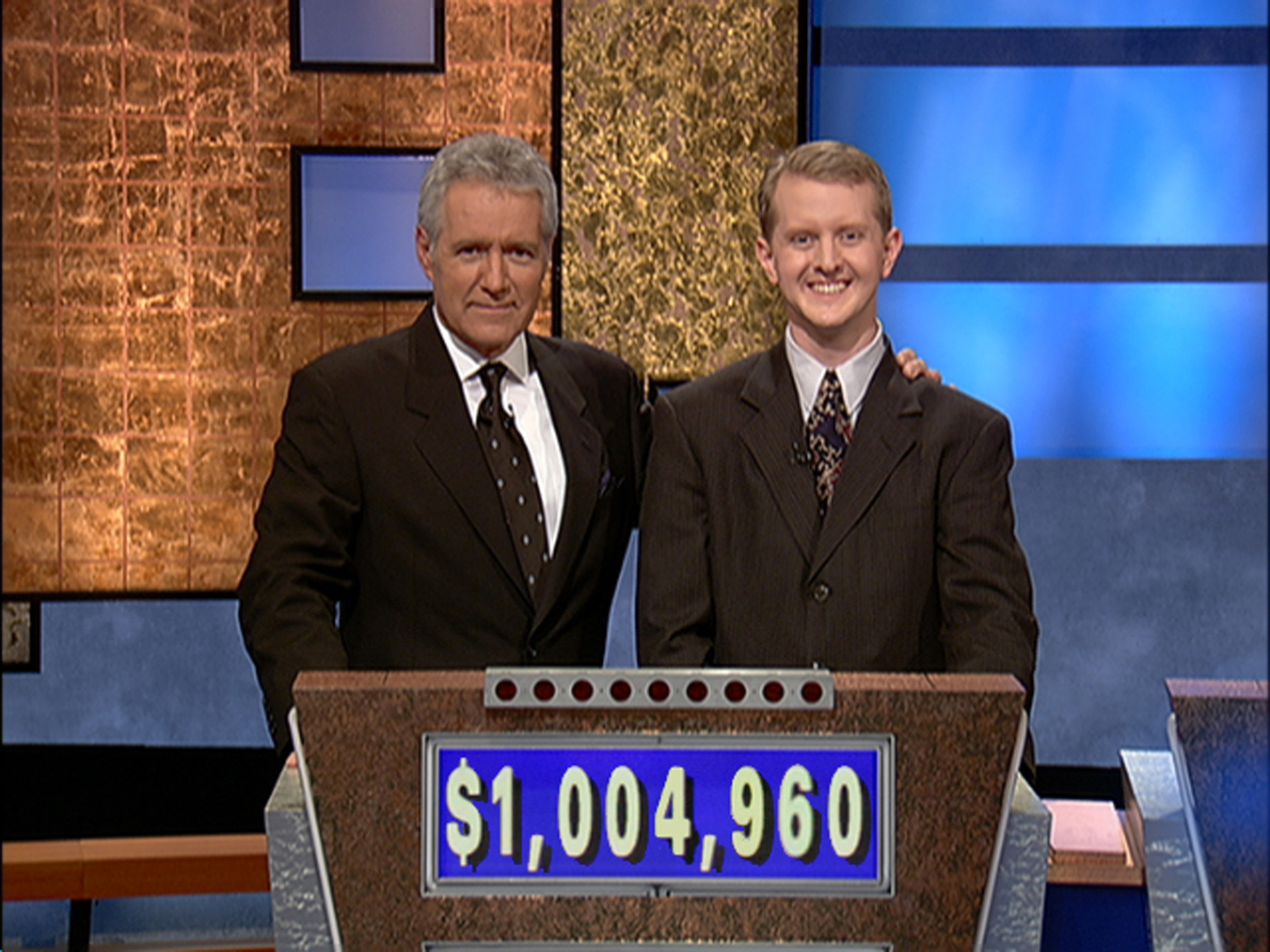- “Jeopardy” has been a popular game show for 35 years.
- “Jeopardy” champions are smart in a way that no one expects when it comes to money.
- The poster boy of “Jeopardy,” Ken Jennings, said much of his nearly $4 million in winnings have been “invested in stocks, bonds, and real estate.”
What is a way to become famous and earn loads of money by answering questions?
“This is ‘Jeopardy!'”
Every night, three contestants compete on “Jeopardy” by buzzing in at trivia questions in the hopes of starting a winning streak and taking home cash.
"Jeopardy" has been a TV staple since 1984, racking up 34 Emmy Awards and a Peabody and even turning some contestants into celebrities. While host Alex Trebek is no doubt the star, occasionally a contestant will end up more than a one-time phenom.
From Ken Jennings to Brad Rutter - who both went up against IBM supercomputer Watson back in 2011 - repeat champions have not only won games and millions of dollars, but the attention and adoration of viewers.
Sometimes, a winning contestant will mention what they plan on doing with their money - spending for a wedding, a new car, or a house are all common answers. But many of the show's biggest winners have more in common than their intelligence: they invested the bulk of their winnings.
We found out what five of the most popular and successful candidates in "Jeopardy" history did post-show. Find out what each has spent their winnings on.
Ken Jennings — perhaps the most famous of all "Jeopardy" contestants — won 74 consecutive games back in 2004. In his initial run, Jennings earned $2.52 million.

He won even more money on other "Jeopardy" appearances, and trips to other game shows including "Are You Smarter Than a Fifth Grader?" and "Grand Slam." In total, Jennings has won $3,923,414 from game shows.

Source: Celebrity Net Worth
Jennings says the greatest luxury his earnings allowed him was to spend more time with his wife and two children. He was also able to move from Utah to Seattle and buy a house.

Source: Jeopardy!
On his blog, Jennings said he took care of the three essential T's after winning — "taxes, tithing, and widescreen TV." Jennings is a Mormon and the Church of Latter Day Saints requires Mormons to give the church 10% of their yearly income in tithes.

Sources: LDS.org, Ken Jennings
Jennings says most of his game-show money is invested in stocks, bonds, and real estate. "I don't want to be one of these lottery winners you see bankrupt on TV a few years later, having already lost it all," he writes on his blog.

Source: Ken Jennings
The "Jeopardy" champion has also donated some money and plans to contribute more to educational causes. He jokingly warned fans to refrain from asking him to pay off their student loans.

Source: Ken Jennings
"I kept my programming job right through the end of my 'Jeopardy' streak," Jennings wrote on his blog. After becoming a nerd icon, Jennings got a book deal and has authored several books. He is now "a freelance writer pretty much full-time."

Source: Ken Jennings
Before Jennings, Brad Rutter was the highest-earning champion on "Jeopardy." Rutter's initial run was only five episodes because the show had a five-game maximum limit when he arrived on set in 2000.

Despite playing fewer games than Jennings, Rutter has actually earned more money from "Jeopardy" — over $3,450,000 from all of his appearances. Rutter defeated Jennings in three tournaments and has never lost to a human, but did see defeat from IBM's Watson computer in 2011.

Source: Celebrity Net Worth
During an in-game interview on the Battle of the Decades tournament, Rutter said that he was going to purchase a new Porsche with his winnings, but later said host Alex Trebek convinced him otherwise. "I had to scuttle the Porsche plan because Alex expressly forbade me from buying one at the wrap party, and I know which side my bread is buttered on," Rutter said. He did say he would buy a car and take a vacation to Paris.

Sources: The Atlantic, CBS
Rutter also updated his wardrobe. "I was 22 when I first was on the show so I was still wearing clothes that my parents had bought me to go to funerals and stuff like that," Rutter told Vanity Fair. "The first time I thought about buying my own clothes was the first time I had money to do so."

Source: Vanity Fair
Rutter has donated at least $100,000 to the Lancaster County Community Foundation and given to his hometown library in Pennsylvania. He now lives in Los Angeles and is pursuing an acting career.

Source: Lancaster Online
Rutter told AOL that he can pursue acting without taking on a side job like most struggling artists. He said he did eventually buy a Porsche and then had his father — a financial adviser — pursue a conservative investment strategy with the rest of his winnings.

Source: AOL
Julia Collins' 20-game win streak is the second-longest in "Jeopardy" history and her $428,100 pot is the most any woman has won on the show. Collins was 31 years old and out of work when she was a contestant.

Collins said she took a month long trip to Paris and spent a week in London right after winning. The Wellesley and MIT graduate said her previous job as a consultant was lucrative and she was able to pay off her student loans before appearing on "Jeopardy" because she lived at home with her parents and kept her expenses low.

Source: Kiplinger
After hiring a tax professional she said she would probably invest in index and mutual funds with her six-figure prize.

Source: Kiplinger
Collins founded Girls Like You and Me, a nonprofit organization, and is CEO.

Source: Girls Like You and Me
Austin Rogers became a huge phenomenon in 2017 with his untamed hair and wild antics on "Jeopardy." The New York City bartender won 12 games and $411,000.

"I don't have any real need for that much money," Rogers told USA Today. "I live a happy life, I've got a nice apartment, I don't have a girlfriend that I need to spend money on right now, I don't like fancy clothing, I don't have a car."

Source: USA Today
During the Tournament of Champions, Rogers outlined plans to drive across the globe in an old car. To start, Rogers committed to buying a 1991 Mercedes-Benz station wagon. An estimate put his gas bill at $4,000.

Source: Jalopnik
"I'll go drive down through Mexico and stuff like that, take it around the Darién Gap, go down the Andes, ship it to South Africa, go up the middle of Africa, across to Gibraltar, from Gibraltar all the way down to Vladivostok, go over across through India, ship it from India to Perth, Perth to Sydney, Sydney to Anchorage, Anchorage to New York," Rogers told Trebek.

Source: Jalopnik
Rogers said he is not a big spender and will most likely be saving his winnings. He also says that since his appearance on "Jeopardy" his job has never been more lucrative because fans flock to his bar and leave big tips.

Sources: USA Today, Bedford and Bowery
Rogers said he bought a $1,000 phone with his winnings, but unfortunately still can't afford to buy a house in his hometown of Westchester.

Source: Lohud
Arthur Chu's unconventional style caused heated debate amongst "Jeopardy" fans in 2014 when he won 11 games and nearly $300,000.

Source: Arthur Chu
Chu told MONEY that the cash prize afforded him the valuable commodity of time. "To be able to live a life basically like the one I have now but to have that time freed up — that's worth more than any car or any cruise," Chu said.

Source: MONEY
Before appearing on the show, Chu had been a voice artist and insurance analyst but now works as a writer for The Daily Beast and Salon.

Source: Pacific Standard
Chu ditched his glasses after "Jeopardy" because he got a free LASIK surgery in exchange for his celebrity endorsement.

Source: Pacific Standard
Chu was known as a risk-seeking player but claimed to be a risk-adverse investor before winning on "Jeopardy." He said he's been more aggressive with his investments, but still uses Vanguard and puts his money in index funds.

Source: MONEY

